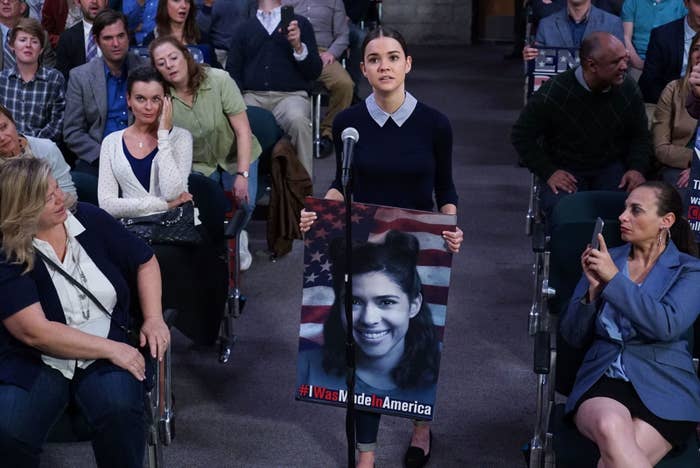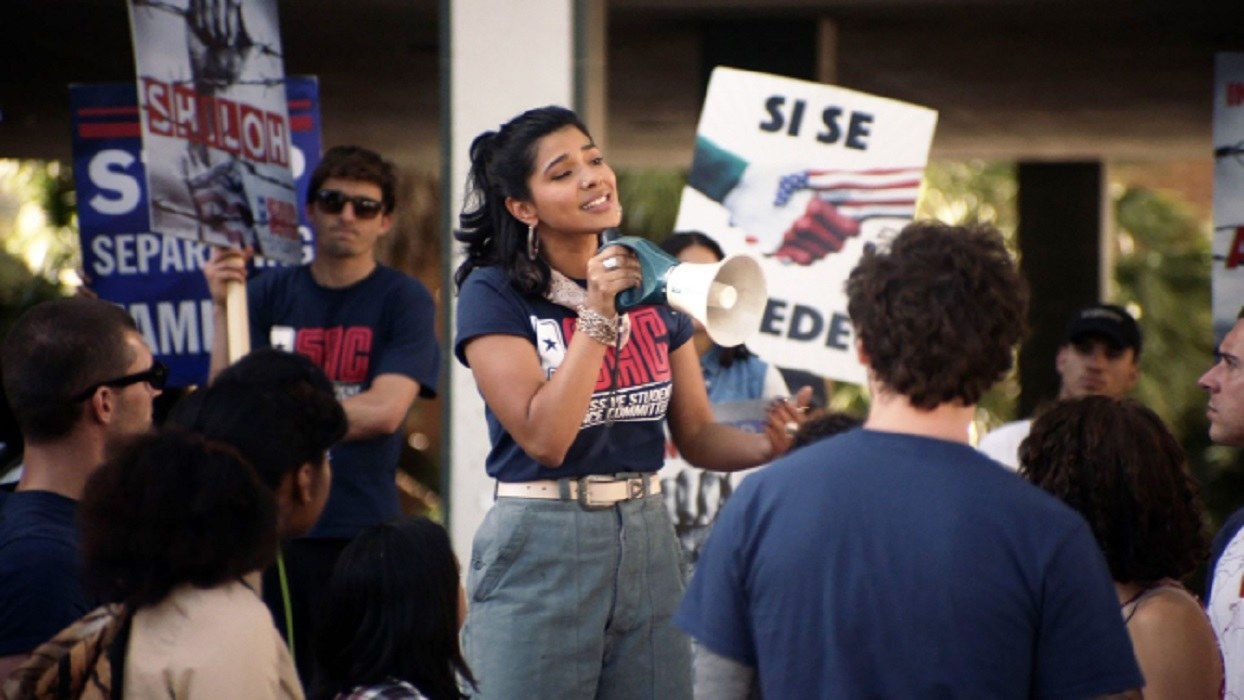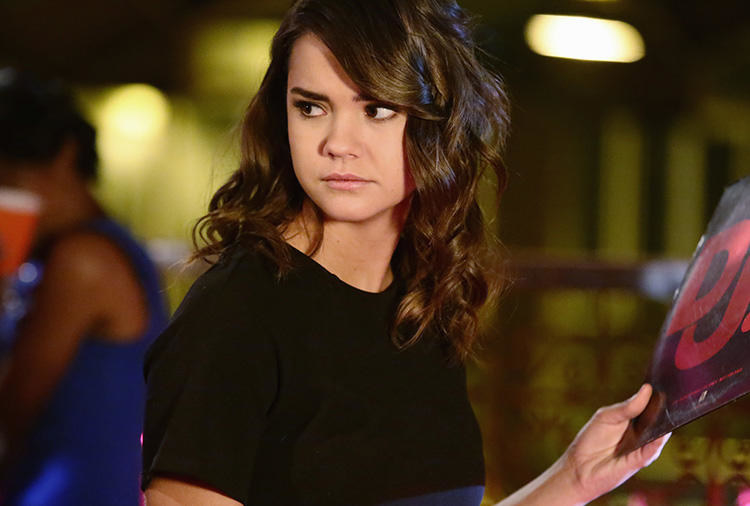
The midseason finale of the final season of The Fosters took place during an all-too-familiar moment of crisis. Ximena (Lisseth Chavez), a college student who’d recently befriended the series’ main character, Callie (Maia Mitchell), announces at a protest that she’s an immigrant currently living under the Deferred Action for Childhood Arrivals policy. In the finale’s cliffhanger, Immigration and Customs Enforcement agents come searching for Ximena, forcing her to seek sanctuary in a local church. Though the character had come out to Callie — and the audience — as undocumented in an episode that aired in August, the midseason finale was Sept. 5. That same day, in the real world, President Donald Trump moved to end DACA. The decision spurred protests and caused a very real crisis for the approximately 800,000 people who’d made use of its protections.
“For us, the truth is the political is personal, and vice versa.”
The coincidence of the timing was, in a way, a typical moment for The Fosters. “It’s this strange thing where I almost feel like they have a crystal ball,” Mitchell told BuzzFeed News during a set visit last November. She noted that the day Proposition 8 was invalidated and marriage equality was restored in California was also the day the cast and crew of The Fosters were filming the wedding between the show’s central lesbian moms, Sherri Saum’s Lena and Teri Polo’s Stef. It also just so happened that the episode in which Callie goes on her first date with Aaron (Elliot Fletcher), a young trans man — the first time the lead in any teen drama entered into a romance with a trans character — aired the day before Trump tweeted that he’d ban transgender people from the military. “They’re obviously very thoughtful in their research, and very aware of the political climate and what’s happening and what’s about to happen,” Mitchell said of the show’s writers. “It affects a lot of people, a lot of Americans, so we put it on blast.”
Though it was never the most buzzed-about show on TV, The Fosters — which ends with a three-part finale starting June 4 — carved out a place for itself as an intensely relevant series that took the intersection of the personal and the political seriously. For executive producers Peter Paige, Bradley Bredeweg, and Joanna Johnson, that was central to the show’s premise. “We wanted to do a traditional family drama about a nontraditional family,” Paige said. As such, The Fosters is built around two moms and their five children, four of whom came to the family through the foster system. “For us, the truth is the political is personal, and vice versa,” Paige said. “And for these people, for anyone who’s a member of a marginalized community, that’s more true than ever.”

Johnson told BuzzFeed News that they never intended for The Fosters to become an “issues” show. But the show’s strong political heart has always been clear, and as the show went on, that often shaped the stories they decided to tell. “We think it’s really important that [DREAMers] who were brought here, many of them when they were babies, who’ve known no other country, who are absolutely Americans, have a right to stay in this country and should have a pathway to citizenship,” Johnson said in explaining why they chose to include a story about a DREAMer. “We felt really strongly about that, especially with this administration coming in so anti-immigration. We just really wanted to tell that story and put a real personal face on it.”
Speaking to BuzzFeed News during that November set visit, Chavez teared up while talking about the power of portraying Ximena. “It’s not something where I’m just on set like, Oh, I did my role, and then I just go back to being me. This is real,” she said. Chavez noted that a lot of Fosters fans, including many DREAMers, have reached out to her about the impact of the character. “They told me they were touched, and they fell in love with the character and said they could relate to her,” she said.
Ximena’s story, which extended to her parents’ deportation trial, is only one example of the show’s approach to broaching the political through the personal. Through Callie and her younger brother Jude (Hayden Byerly), the show dove deep into the traumas of the foster system, from in-home abuse to the legislation and for-profit companies that can enable that abuse. The series was also the site of major LGBT representation from the start with Lena and Stef, and eventually also through Jude, multiple trans characters, and countless queer supporting characters. When, at 13, Jude had his first kiss with another boy (Gavin MacIntosh’s Connor), it marked the youngest-ever same-sex kiss on television. The kiss sparked discussion about the ground it was breaking, and about the lack of stories featuring characters that young exploring their queerness. The show also had a racially diverse cast from the jump, with a biracial black lesbian mother, two adopted Latinx teens, and hordes of supporting characters of color.
“With this family, they would be politically engaged, and they would be confronted with the challenges of the system, with institutional bias and racism, with homophobia, with all of those things,” Paige said. Bredeweg added, though, that the show’s writers didn’t try to rip stories from the headlines. “We always came at these stories from a very organic, character-driven place. It would hinge on their experience and what was going on for them in the world, and that’s where we’d start to see what’s happening politically that would affect them.” And throughout the show’s five-season run, the characters on The Fosters were perfectly positioned to reflect some of the biggest political stories of the day.

The show found a powerful heart in Callie, the strong-willed teen the pilot is centered on. When the audience — and Lena and Stef — meet Callie, she’s distrustful and entirely focused on freeing her brother from an abusive foster home. Through her, the show also dove into sensitive stories about sexual assault and post-traumatic stress disorder: We learned that Callie was raped by a former foster brother prior to the start of the series, and she dealt with the aftermath throughout the show’s first few seasons. Because she was also thrown into a juvenile detention center for standing up for herself and her brother in an abusive home — and because her record was forever affected because of that — it’s through Callie that we also see plenty of the horrors of the prison and justice systems. She’s a young woman who has been taught by the institutions in charge of caring for her that she is worth nothing, and The Fosters’ strongest emotional arc came in watching her slowly unlearn that lesson — both through finding a family and in her own railing against the system. “The thing we always wondered about Callie from the very first episode was, who would she be if she hadn’t had this damage, if she hadn’t had this heartbreak, this trauma?” Paige said. He calls her arc “a five-year kind of unveiling of that pure heart underneath all the hurt.”
It’s an arc they’re still invested in: Callie, along with her sister, Mariana (Cierra Ramirez), will be the center of The Fosters’ upcoming spinoff, Good Trouble, which will follow the two in their twenties in Los Angeles. “I think it is a great extension of the heartbeat of The Fosters,” Paige said. “It’s messier and more grown-up, but I do think it shares the same kind of bracing optimism in the face of the reality of the world that we actually live in.”
With The Fosters’ tendency to do the most also came some of its greatest achievements, including its constant political relevance and its big, sloppy beating heart.
The Fosters had its ups and downs over the years. There was an ill-advised romance between Callie and her foster brother Brandon (David Lambert), and a few too many shootings and murders involving its core characters. But with The Fosters’ tendency to do the most also came some of its greatest achievements, including its constant political relevance and its big, sloppy beating heart. When the show tackled a subject, it threw its full weight behind it, and out of that came a number of storylines that are still incredibly rare to see fleshed out on TV. The Fosters made its mission to give agency to the types of characters and people who are usually denied it. It was also fully earnest, a rarity in an era so full of edgy “prestige” TV that often removes itself from that kind of hopefulness when telling stories that involve politics.
Asked how he’d like people to remember The Fosters, Bredeweg said that for a long time his goal was to make the show feel “a little timeless.” But his position on that has changed. “Because [of] the kind of things we tackled, and the kinds of things [these characters] had to face, I want people 10, 15 years from now to watch and think, Thank god we don’t have to face that bullshit anymore,” he said. “Thank god we’ve moved on and become a better society because of it. That’s what I hope for for the show.”
